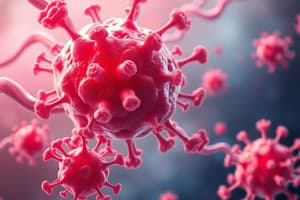Podcast
Questions and Answers
Active recall involves trying to remember answers from memory before looking at the options.
Active recall involves trying to remember answers from memory before looking at the options.
True (A)
Insufficient practice is not a contributing factor to poor performance in biochemistry.
Insufficient practice is not a contributing factor to poor performance in biochemistry.
False (B)
Understanding precise terminology is essential for success in biochemistry.
Understanding precise terminology is essential for success in biochemistry.
True (A)
Overlooking key details in questions can enhance your chances of answering correctly.
Overlooking key details in questions can enhance your chances of answering correctly.
Diagrams and images are not helpful tools when studying biochemistry.
Diagrams and images are not helpful tools when studying biochemistry.
Biochemistry MCQs are used to evaluate understanding of fundamental biological concepts and principles.
Biochemistry MCQs are used to evaluate understanding of fundamental biological concepts and principles.
Factual recall questions assess the ability to apply knowledge to solve problems.
Factual recall questions assess the ability to apply knowledge to solve problems.
MCQs on carbohydrates may include questions about polysaccharides like starch and glycogen.
MCQs on carbohydrates may include questions about polysaccharides like starch and glycogen.
Lipid digestion and storage are not important topics in biochemistry MCQs.
Lipid digestion and storage are not important topics in biochemistry MCQs.
The four levels of protein structure include primary, secondary, tertiary, and quaternary.
The four levels of protein structure include primary, secondary, tertiary, and quaternary.
Enzyme kinetics involves understanding factors affecting enzyme activity like temperature and pH.
Enzyme kinetics involves understanding factors affecting enzyme activity like temperature and pH.
Nucleic acids only refer to DNA and do not include RNA.
Nucleic acids only refer to DNA and do not include RNA.
Regular practice of MCQs is unnecessary for exam preparation in biochemistry.
Regular practice of MCQs is unnecessary for exam preparation in biochemistry.
Flashcards
Biochemistry MCQ Weak Areas
Biochemistry MCQ Weak Areas
Focus on areas needing more understanding in Biochemistry Multiple Choice Questions (MCQs). Seek help from instructors or peers for clarification.
Visualizing Diagrams(Biochemistry)
Visualizing Diagrams(Biochemistry)
Use diagrams and pictures to help you comprehend complex biochemical processes and solve related questions.
Memorization in Biochemistry
Memorization in Biochemistry
Memorize crucial structures and pathways for biochemistry questions; know reaction stages, intermediary products, and analogous principles.
Biochemistry Time Management
Biochemistry Time Management
Signup and view all the flashcards
Critical Thinking in Biochemistry
Critical Thinking in Biochemistry
Signup and view all the flashcards
Biochemistry MCQs
Biochemistry MCQs
Signup and view all the flashcards
Factual Recall MCQs
Factual Recall MCQs
Signup and view all the flashcards
Conceptual Understanding MCQs
Conceptual Understanding MCQs
Signup and view all the flashcards
Application MCQs
Application MCQs
Signup and view all the flashcards
Carbohydrates in Biochemistry
Carbohydrates in Biochemistry
Signup and view all the flashcards
Lipids in Biochemistry
Lipids in Biochemistry
Signup and view all the flashcards
Proteins in Biochemistry
Proteins in Biochemistry
Signup and view all the flashcards
Nucleic Acids in Biochemistry
Nucleic Acids in Biochemistry
Signup and view all the flashcards
Study Notes
Biochemistry Multiple Choice Questions (MCQs): Study Notes
- Biochemistry MCQs are a common assessment method used to evaluate understanding of fundamental biological concepts and principles.
- Questions often relate to the structure, function, and metabolism of biomolecules.
- Practice with these questions is key for exam preparation and improving comprehension of biochemistry.
Types of Biochemistry MCQs
- Factual Recall: These questions test the ability to remember basic facts, definitions, and concepts covered in biochemistry. Typical keywords include "which," "what," "identify."
- Conceptual Understanding: These questions go beyond simple recall, requiring the application of knowledge to solve problems or analyze scenarios. Example keywords might include "explain," "interpret," or "justify."
- Application: These questions evaluate the ability to apply biochemical principles to real-world scenarios. Example keywords include "calculate" or "predict."
Key Topics Covered in Biochemistry MCQs
- Carbohydrates: Questions might address the structure of monosaccharides (glucose, fructose), disaccharides (sucrose, lactose), polysaccharides (starch, glycogen), and their metabolic pathways.
- Lipids: MCQs may focus on the structure of different lipid classes (triglycerides, phospholipids, steroids), their functions in the body, and related metabolic processes. This includes questions on lipid digestion, transport, and storage.
- Proteins: Questions may cover protein structure (primary, secondary, tertiary, quaternary), protein function (enzymes, hormones, structural proteins), and protein synthesis. Common areas include protein folding, denaturation, and protein modifications.
- Nucleic Acids: Questions may ask about the structure of DNA and RNA, the process of replication, transcription and translation, and genetic code.
- Enzyme Kinetics: Understanding enzyme activity, substrate specificity, and factors affecting rates (temperature, pH) are common topics.
Preparing for Biochemistry MCQs
- Review Key Concepts: Thoroughly review all lectures, textbook chapters, and notes on the material.
- Understand Mechanisms: Focus on understanding the mechanisms behind biochemical reactions and processes.
- Practice Regularly: Solve as many MCQs as possible from various sources like past papers, practice books, and online resources.
- Identify Weak Areas: Pay particular attention to areas you struggle with and seek clarification from your instructor or peers to gain a deeper understanding.
- Use Diagrams and Images: Biochemistry often involves complex diagrams. Practice visualizing these representations to solve associated questions.
- Memorize Key Facts: Memorizing key structures and pathways will aid in solving these kinds of questions. Know reaction steps, intermediates, and related concepts.
- Time Management: Practice timed question-solving sessions to improve speed and endurance during assessments.
- Critical Thinking: Develop the ability to critically analyze the presented information and apply relevant concepts to solve the problem.
Common Pitfalls in Biochemistry MCQs
- Misunderstanding of Terminology: Precise definitions are necessary for success in biochemistry; make sure you utilize this precise terminology when you are preparing your answers.
- Overlooking Key Details: Carefully read and analyze all details within the provided question content before attempting to answer.
- Incorrect Application of Concepts: Ensure that you are accurately applying your knowledge to the presented problem or concept.
- Insufficient Practice: Engaging in sufficient practice is critical to gaining experience in addressing the different question types and concepts.
Tips for Success
- Active Recall: Actively try to recall answers from memory before looking at the options.
- Identify the Incorrect Options: Critically analyze the provided answer options to determine the most plausible correct choice, rather than just trying to eliminate incorrect ones.
- Explain Your Thinking: Always explain your answers to practice applying relevant concepts, and help to ensure you fully understand the biochemistry involved.
Studying That Suits You
Use AI to generate personalized quizzes and flashcards to suit your learning preferences.




